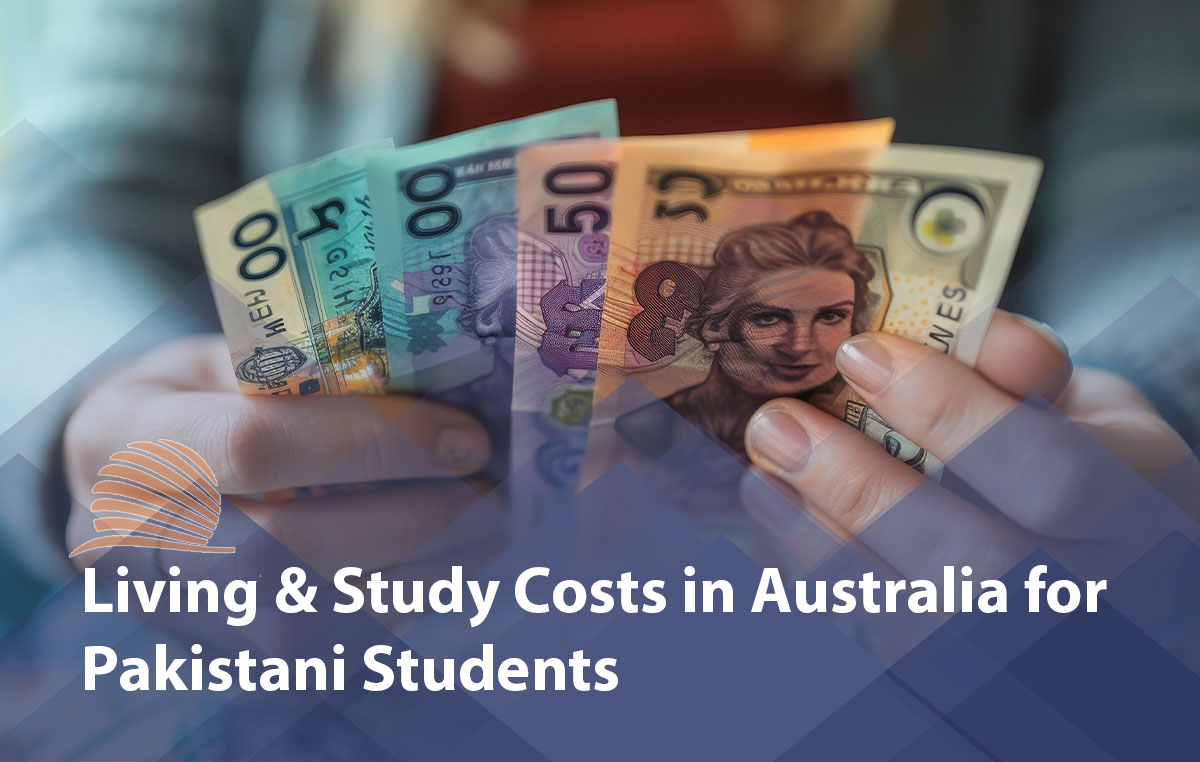Why Pakistani Students Choose Australia As Study Destination

Study abroad expert advice
Don't waste time! just fill the form to get help.
Costs & Living in Australia for Pakistani Students
Studying in Australia is a life-changing experience, but understanding the cost of living and tuition fees is essential for proper planning. Australian cities offer high-quality education, excellent infrastructure, and a safe environment, but these come with associated expenses. This guide breaks down tuition, living costs, and budgeting tips specifically for Pakistani students.
1. Tuition Fees
Tuition fees vary based on the university, course, and level of study:
Program Level | Average Annual Tuition (AUD) | Example Courses |
Undergraduate | 20,000 – 45,000 | Engineering, Business, IT, Arts |
Postgraduate | 22,000 – 50,000 | MBA, Medicine, Law, Science |
Research (PhD) | 18,000 – 42,000 | Science, Engineering, Social Sciences |
Tip: Some courses, such as medicine or architecture, may have higher tuition fees due to additional resources or lab work.
2. Living Costs
Living expenses depend on city, lifestyle, and accommodation choice. On average, Pakistani students can expect the following annual costs:
Expense Category | Estimated Annual Cost (AUD) | Notes |
Accommodation | 8,000 – 15,000 | Shared apartments, on-campus housing, or homestays |
Food & Groceries | 3,000 – 5,000 | Home-cooked meals are cheaper than eating out frequently |
Transport | 1,000 – 2,000 | Public transport passes, bicycles, or occasional taxis |
Utilities & Internet | 1,200 – 2,000 | Electricity, gas, water, and internet services |
Health Insurance (OSHC) | 500 – 700 | Mandatory for international students |
Personal Expenses | 2,000 – 3,500 | Entertainment, clothing, leisure activities |
Tip: Cities like Sydney and Melbourne are more expensive than Brisbane, Adelaide, or Hobart.
3. Accommodation Options
- On-Campus Housing: Convenient, includes utilities, but slightly more expensive.
- Shared Apartments / Hostels: Affordable option, share rent and bills with roommates.
- Homestays: Live with an Australian family for cultural immersion; includes meals and utilities.
- Private Rentals: Offers independence but requires budgeting for rent, bills, and deposits.
4. Budgeting Tips for Pakistani Students
- Part-Time Work: International students can work up to 48 hours per fortnight during semester and full-time during breaks.
- Cook at Home: Preparing meals reduces food costs significantly.
- Use Public Transport: Student discounts are available on buses, trains, and trams.
- Apply for Scholarships: University and government scholarships can reduce tuition fees.
- Track Expenses: Use budgeting apps to monitor spending and avoid unnecessary costs.
Tip: Planning a monthly budget of AUD 1,500–2,000 can help manage living expenses efficiently.
5. Other Costs to Consider
- Textbooks & Study Materials: AUD 500–1,000 per year depending on the course.
- Medical Expenses: Routine check-ups and emergencies not covered by OSHC.
- Travel & Leisure: Weekend trips, sports, and entertainment vary depending on lifestyle.
6. Financial Planning
Pakistani students should:
- Save in advance to cover initial tuition and living expenses
- Consider part-time work to supplement income
- Explore student loans or family sponsorship if needed
- Factor in unexpected expenses, such as health emergencies or travel
Proper financial planning ensures a stress-free study experience and allows students to focus on academics and cultural exploration.
Conclusion
While studying in Australia involves significant costs, careful planning and budgeting can make it manageable for Pakistani students. Tuition fees, accommodation, food, and transport are the main expenses, but scholarships, part-time work, and smart financial management can reduce the burden.
Australia offers world-class education, safe cities, and vibrant student life, making it worth the investment. By understanding costs and planning ahead, Pakistani students can enjoy a fulfilling and enriching study abroad experience.









 Scholarships 2026 – Fully Funded Oxford Degrees (36).jpg)
 Scholarships 2026 – Fully Funded Oxford Degrees (35).jpg)
 Scholarships 2026 – Fully Funded Oxford Degrees (32).jpg)
 Scholarships 2026 – Fully Funded Oxford Degrees (30).jpg)
 Scholarships 2026 – Fully Funded Oxford Degrees (29).jpg)
 Scholarships 2026 – Fully Funded Oxford Degrees (26).jpg)